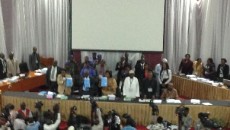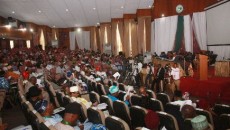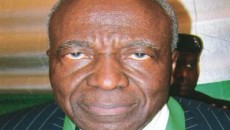The delegates rejected the ban on the importation of generating sets.
The delegates to the ongoing National Conference on Monday approved an amendment asking the Federal Government to declare a state of emergency in the power section “in other to live up to the promise made by the late President Umaru Yar’Adua.
They, however, rejected a proposal banning the importation of generating sets into Nigeria and dropped an amendment seeking the use of generating sets in Nigerian market.
The amendments were proposed by delegates while considering the report of the Committee on Energy chaired by a former governor of Oyo State, Rasheed Ladoja.
The delegates, who had defied the early downpour in Abuja to attend the plenary session, concluded debate on the report in the morning session and voted on the recommendations and amendment proposed by members during the afternoon session.
During the debate, a Peoples’ Democratic Party, PDP, delegate, Ahmadu Ali, called for tougher sanctions against power distribution and generation companies in the country. He said while the cost of power is rising astronomically, the quality of services is not improving.
He lamented the increasing use of wood and charcoal for domestic cooking, saying Nigerians should be taught to use coal.
A former Petroleum Resources Minister, Jubril Aminu, said it was time Nigeria stopped using firewood. According to him, as a young man, he was told of equatorial forest and adding that such forests had
disappeared.
“If you travel from here to Enugu and to Port Harcourt you won’t see trees again. They have been cut down,” he said.
A former Head of Civil Service, Ebere Okeke, supported the call for the ban on generators due to the excessive way in which carbon monoxide was being generated.
Tempers, however, rose when the delegates were considering an amendment that the Niger Delta Energy Corridor should be established so as to serve as a veritable tool for the rapid industrialization and diversification of the Nigerian economy.
While senators from the south spoke in favour of the amendment proposed by Kimse Okoko, a delegate from Bayelsa State, northern delegates opposed it.
It took the intervention of a former acting PDP Chairman, Haliru Mohammed from Kebbi State, and a representative of the Nigerian Guild of Editors, NGE, for the northern delegates to vote in favour of the amendment.
Among the recommendations and amendment approved by the Conference include:
-That government should consider the construction of mini refineries in each state as it is done in Malaysia;
-That communities close to gas flaring should be paid compensation for the effect of gas flaring;
-That a three-year time frame should be set within which the nation’s refineries should be put into operation;
-That that government should phase out the use of generator in all market to avoid respiratory track crisis;
-That government should release take-off grants to HYPADEC so that the communities in rivers banks would have access to power;
-That there should be total ban on gas flaring;
-That the power of the minister to grant exemption of gas flaring should be abolished under the nation’s laws;
-That laws should be enacted (and those available should be enforced) at the state and local government levels to control indiscriminate cutting of trees for household energy and charcoal making and export;
-That the Petroleum Act 1999 should be reviewed in the interest of justice and equity;
-That the Petroleum Industry Bill, PIB, should have a third objective which should include protection and preservation of the environment where minerals are found; and
-That street lighting in Nigeria should be by solar energy.
Among the recommendations rejected by the Conference are:
-That the Federal Government should set aside at least 60 per cent of the oil revenue as Capital Development Fund;
-That the privatisation contract between the Federal Government and GENCOS and DISCOS, which is observed to be on the brink of collapse, should be reappraised;
-That 25 per cent of the nation’s annual budget should be set aside to take
care of power generation programme in the next five years; and
-That 20 per cent of the NNPC’s 60 per cent equity in JVC and IOCs be given to the oil-producing states.



